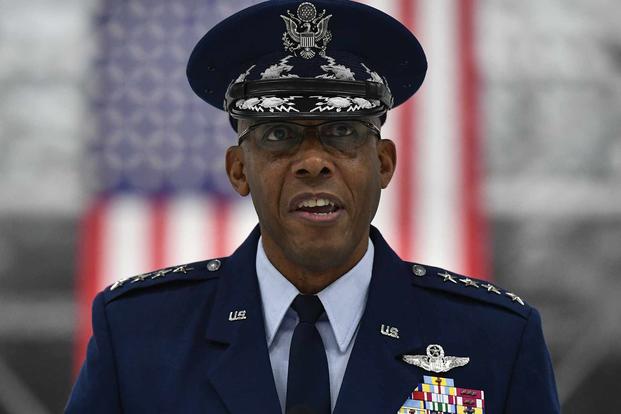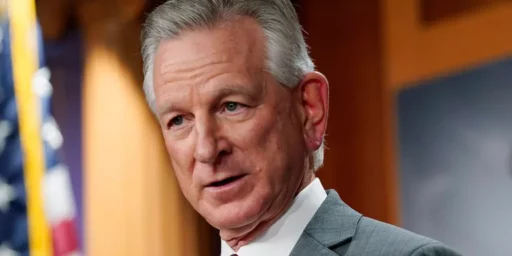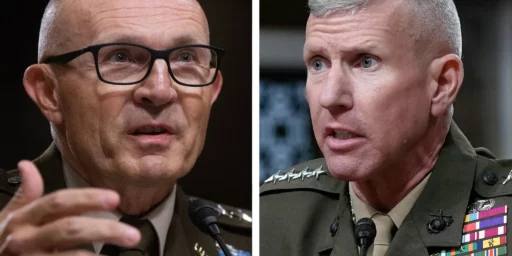Charles “CQ” Brown Confirmed as Joint Chiefs Chairman
The Senate is voting one-by-one in the face of the Tuberville hold on top nominees.

WaPo (“Senate confirms Joint Chiefs chair in respite from Tuberville blockade“):
The Senate on Wednesday confirmed Air Force Gen. Charles Q. Brown Jr. as the next chairman of the Joint Chiefs of Staff, with Democrats briefly relenting in their ongoing feud with Sen. Tommy Tuberville (R-Ala.) to push through President Biden’s nominee for the military’s top job.
The 83-11 vote avoids what had been the embarrassing prospect of a temporary administrator filling the Pentagon’s most prestigious post. Yet it leaves about 300 other senior officers ensnared in Tuberville’s months-long hold on military promotions with no clear path to advancement, as the underlying political standoff over the Defense Department’s abortion policy exhibits no signs of abating.
Brown, who becomes only the second African American, after Gen. Colin Powell, to ascend to the chairman’s post, was confirmed after Senate Majority Leader Charles E. Schumer (D-N.Y.) chose to peel away the nomination for an individual vote. Senior officer promotions are typically approved by the Senate through unanimous consent to avoid lengthy floor debates and the politicization of votes around military commanders.
Schumer also moved forward with what could be individual confirmation votes on Marine Corps Gen. Eric M. Smith and Army Gen. Randy George to lead their respective services, appearing to leave open the possibility that the Senate will move to install new heads of the Navy and Air Force once their nominations clear scrutiny from the Senate Armed Services Committee.
The 11 senators voting against Brown were all Republicans: Mike Braun (Ind.), Ted Cruz (Tex.), Josh Hawley (Mo.), Mike Lee (Utah), Roger Marshall (Kan.), Eric Schmitt (Mo.), J.D. Vance (Ohio), Ron Johnson (Wis.), Cynthia M. Lummis (Wyo.), Marco Rubio (Fla.) and Tuberville.
A spokesperson for Brown said the general had no immediate comment.
In a statement congratulating Brown, Defense Secretary Lloyd Austin called him “a tremendous leader” and said “it is well past time” to confirm the other military nominees. “The brave men and women of the U.S. military deserve to be led by highly-qualified general and flag officers at this critical moment for our national security,” he added.
Tuberville imposed his hold on all senior military nominations in February, staging a dramatic protest of the financial assistance rendered to service members and their dependents who must leave the state where they are stationed to obtain an abortion. The Biden administration established the travel-reimbursement policy after the Supreme Court overturned Roe v. Wade in June 2022, as Republican-led states began to ban or severely restrict access to reproductive health care.
Until Wednesday, Democrats had refused to vote on the nominations individually, as Tuberville suggested they should. Schumer and other Democrats had long argued that to deviate from the Senate’s standard procedure of approving noncontroversial military nominations in large batches would serve only to encourage other lawmakers with political grievances to attempt a similar gambit, but they reversed course with Brown’s soon-to-be predecessor, Gen. Mark A. Milley, approaching his Sept. 30 legal deadline to step down from the chairman’s post.
An independent assessment by the Congressional Research Service last month found that working on all frozen nominations one-by-one would take months, even if the Senate focused on virtually nothing else.
After Brown’s confirmation vote, the Senate late Wednesday approved a motion to advance George’s nomination to lead the Army, with a final confirmation vote expected sometime Thursday. Efforts to advance Smith’s nomination to take over the Marines also should take place Thursday.
In a statement attacking Tuberville as “the sole cause of this crisis,” Sen. Jack Reed (D-R.I.), who chairs the Senate Armed Services Committee, said that Democrats “have no problem with voting on the most senior military officers” instead of the usual process of unanimous consent.
NYT (“Senate Confirms Chairman of Joint Chiefs of Staff, Sidestepping Tuberville Blockade“) adds:
“The Senate will overwhelmingly vote to confirm them, and these three honorable men will finally be able to assume their positions,” Mr. Schumer said on the Senate floor. “And the abortion policy that Senator Tuberville abhors will remain in place. Senator Tuberville will have accomplished nothing.”
While Mr. Tuberville said he welcomed their quick approvals, he added he would not relent in his push to do away with the abortion access policy. He was among 11 G.O.P. senators who voted against General Brown’s nomination, despite having indicated to reporters in recent months that he would support it.
“They finally figured out I wasn’t going to give in. I’m still not,” Mr. Tuberville told reporters on Wednesday. “They’ve got to do the right thing and move the policy back.”
The White House praised the action but criticized Mr. Tuberville for refusing to back down.
Mr. Schumer’s move, said John F. Kirby, a White House spokesman, was good for the three generals, their military branches and the Defense Department overall, but it “doesn’t fix the problem or provide a path forward for the 316 other general and flag officers that are held up by this ridiculous hold.”
It’s frankly bizarre that Schumer and company didn’t do this weeks ago. While it’s impractical to vote individually on all of the 300-plus nominees who are piling up, they could easily vote on the key billets.
What this is not doing, however, is “circumventing” or “a respite from” Tuberville’s hold. He’s simply withholding unanimous consent and this is the consequence of that: it’s either vote one by one or not at all.
Further, while the criticism of Tuberville is quite justified, his use of this tactic is not unprecedented. Indeed, Tammy Duckworth put a blanket hold on all confirmations for colonel and above in July 2020. Bernie Sanders has a hold on President Biden’s nominee for Director of the National Institutes of Health in an effort to force action on drug prices. JD Vance has had a hold on Justice Department nominees for months as well. The difference is simply one of scale and scope. While Duckworth’s hold was actually wider than Tuberville’s, it was resolved in a matter of days whereas this one has dragged on for months.
The thing is, this isn’t even a traditional hold, wherein on Senator is blocking a confirmation. Tuberville is simply withholding unanimous consent, forcing a debate and floor vote.
Still, it’s clearly well past time to reform Senate rules. It’s not really clear why nominees for one- and two-star officers are even subject to a Senate vote.




If the impracticality is just inconvenience, I don’t understand why hardball is not played, like forcing the Senate to go 24/7 until the job is done. But once again, it is business as usual. Can’t inconvenience anyone.
“with Democrats briefly relenting in their ongoing feud with Sen. Tommy Tuberville (R-Ala.)”
Speaking of the media post the other day, this strikes me as a great example of not putting the emphasis where it belongs (Tuberville) and, in fact, making it sound like the main reason there is an impasse is the Democrats, which is not the case.
@Steven L. Taylor:
No worries, OTB readers will be able to figure it out. 🙂
@Scott:
At the moment that would mean that nothing else could be done in the Senate, including dealing with any vote linked to keeping the government open.
I am not saying that they shouldn’t have done it at some earlier point in time, but they assuredly cannot do it now.
@Steven L. Taylor: The Senate doesn’t convene until 1100 today. The comment was emphasizing exerting pain and inconvenience. So the Senators don’t get on their treadmills for the next couple of weeks or fundraise. Can’t care. Business as usual is not pain.
This is the crux of the issue. Alabaman voters let down the country when they elected this Senator, whose ego soars orders of magnitude over his meager intellect and talent. But truth be told, there is always going to be a few such drags on the institution and therefore the country as a whole. The problem is that he’s a Republican and that party no longer has any meaningful mechanism for reining in their problem children. The rules and norms of the Senate were created in an era where those in leadership positions could sheep dog the petty intellectual lightweights like Tuberville, but that’s no longer true. Inordinate power is given to individual Senators by custom rather than by law, and that custom needs to change.
It’s been many years since I looked at this, but technically all commissioned and other officers (like cadets) need approval. Sometime long ago this was delegated to the Executive for junior officers (01-03). All other officers require Senate approval which usually happens as a pro forma matter.
General and Flag officers are a special case as there are a limited number (less than 1000 by statute) and many have specific responsibilities defined in title 10. FGO’s therefore get most scrutiny.
But fundamentally this is part of Congress’s role in managing the armed forces and the authority flows from the same provision of the Constitution that provides for Senate confirmation of Judges. For military officers, it’s important for civil-military relations and the continued professionalism of the armed forces that the Executive Branch not have unilateral control over military promotions, especially at senior levels.
Just consider what someone like Trump (or worse) would do if military officers did not require Senate approval and he could fill all the senior positions with loyal cronies.
As for Senate rules, the relevant rules are not specifically about promotions or appointments but, as the piece notes, about unanimous consent. The whole idea of unanimous consent is that it’s unanimous. One person disagreeing means it’s no longer unanimous.
So it’s not obvious what the reform would be here. I supposed the Senate could create a set of streamlined voting procedures for appointments that don’t have to go through the full voting procedures.
But as the article points out, Senators love to block unanimous consent for their own peculiar purposes and reasons. It’s not at all clear that most Senators would vote for rules to take away their individual authority to force a full vote.
Based solely, and unfairly, on that picture, perhaps a solution would be to get “CQ” Brown alone in a room with Tuberville and let Brown dress him down.
Well, as Andy pointed out, it is required by the Constitution of the United States. However, the Senate consent has been delegated to the civilian head of the service for most ranks since the senators didn’t want to be bothered with fulfilling their explicit Constitutional duties given the size of the modern American standing armed forces. A similar issue with the unthinking unanimous consent that Tuberville has chosen to not continue in this instance.
I know, why would the legislative branch want to do its job when there are unelected career technocrats who resent such interference.
Kind of an OT strange train of thought. I found myself wondering when we first appoint a woman to chair the Joint Chiefs, what branch will she come from? My crazy, based-on-nothing-much hunch is Navy. What’s yours?
@Scott: I agree with your suggestion. The Senate Majority Leader should schedule a grueling 24/7 voting schudule… and then all the Senators will know they are “Living in Tuberville,” until the fired ex-football coach is relived of his grip on a stupid Senate rule.
When the House shuts down the government by refusing to pass a spending bill, can the Senate use all their free time confirming generals?
@Andy: I get the statutory and civ-mil issues. But, as a practical matter, these votes are pro forma in the same way as those for O-4 through O-6 are. Indeed, this episode illustrates that: the Senate leadership relies on unanimous consent for these approvals because they literally don’t have the time to approve them otherwise. In which case, the objections should be on a by exception basis.
@Jay L Gischer: Yes, probably the Navy as that the only service where women have been in traditional billets long enough. The Navy was the last service to have a four-star woman but that woman (Michele Howard) was a Surface Warfare Officer, whereas those from other services were logisticians. The former is potentially a service chief; the latter, only in theory. Indeed, Howard, like Francheti, was the Vice CNO. It wouldn’t absolutely shock me if Francheti follows Brown as Chairman in four years.
Back in June, Liz Cheney remarked, “What we’ve done in our politics is create a situation where we’re electing idiots.”
Now, I understand that she was generally referring to the morons who now run the House, but clearly Schmitt, Johnson, Lummis, and Tuberville ‘qualify’ under her observation.
I spend most of my mornings in northern Alabama watching fox news and drinking coffee with some old timers. Today was the first time I’ve seen anti-tuberville ads on fox news about this issue. I like Dr Taylor often find myself at extreme odds with the overwhelming electorate of this state but this was an unexpected attack ad and may be seen as progress. I won’t hold my breath but someone with money is at least willing to shake the apple cart.